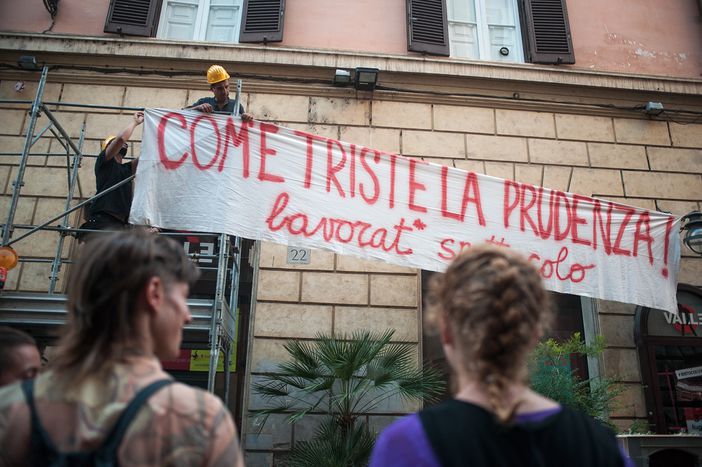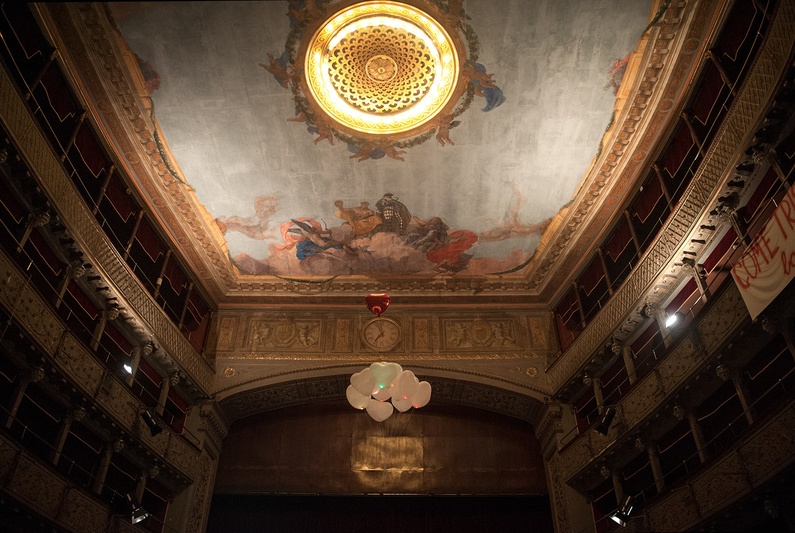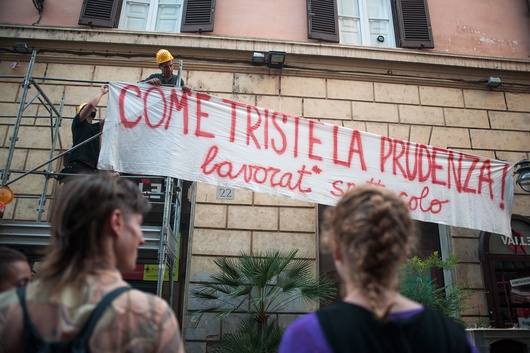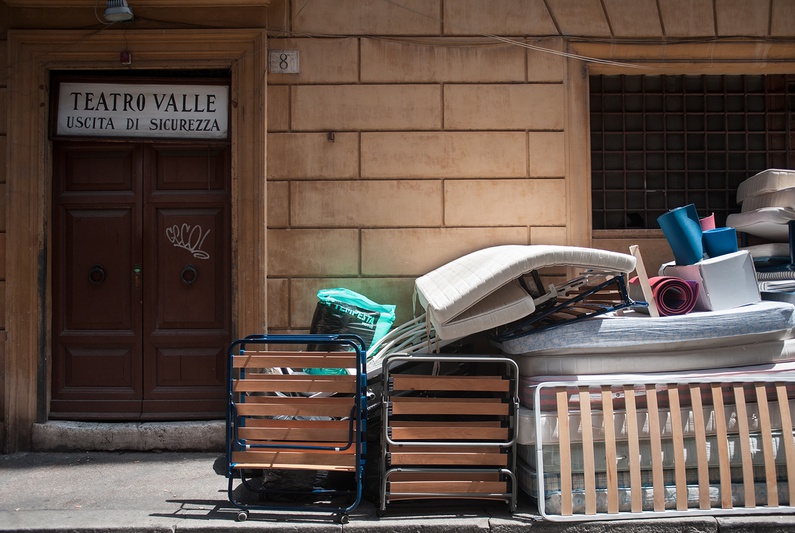
Curtain Falls on the Teatro Valle After Three Years of Resistance
Published on
Translation by:
 Mike Miller
Mike Miller
On August 10th 2014, an artistic resistance centre in Rome, the Teatro Valle, was forced to close its doors. Though it was heralded the world over as a symbol of the democratisation of culture, it was never recognised by city authorities. Throwing in the towel is out of the question for its supporters.
Piazza Navona, the historic centre of Rome. The taxi driver dropped us off. "It's really easy to find, you'll see...look for Valle on the map." We crossed the square and its incessant ballet of tourists. They talked with the imposing statues that sit atop baroque fountains while musicians made the rounds of the terraces with hats in hand. We parted the crowd to reach a small Roman alley that we didn't even bother getting the name of. Just under ten people were sitting on the sidewalk talking, rolling cigarettes, drinking beer. We had reached the Teatro Valle, an imposing eighteenth-century ochre-walled building. The double leaf doors were closed. The previous evening, the doors were still open to all, all the time. "We knew the end was coming, but everything happened so fast..." Marina had been there since the early days of the Teatro Valle occupation. People passed by: neighbours, friends, former occupiers. They hugged and conferred with each other as they sat around the 'Fermata 116', an imaginary bus stop decorated with a bench and small plants. "We built this to encourage passers-by to reclaim their street and their public space and to stop by the Teatro Valle." Everyone had a sad, tired look, like they had been up all night.
The Teatro Valle was more than just a theatre. On June 14th 2011, Roman citizens and artists decided to take over the theatre, which had been closed for several months and was scheduled for privatisation. The spontaneous, ephemeral occupation endured and organised itself. After a few months, they decided to set up the Teatro Valle Foundation (Fondazione Teatro Bene Comune) to transform this historic public institution into a 'commons' that would be neither state- nor privately-owned. It would be a place managed and used by citizens where culture would be a civic education tool. The occupiers even tried to obtain legal recognition for this unprecedented status. "The city's cultural authorities applauded what we were doing but our occupation was always considered illegal," said Guido, an illustrator from Trieste who arrived at the Teatro Valle a year and a half ago. Though this place was unwanted by Rome, it was recognised internationally as a symbol of resistance and a pioneer in the democratisation of culture.
A Cultural and Citizen Agora
"Teatro Valle wasn't a squat. We didn't refuse anyone but we tried to keep people from living in here." A large piece of canvas displaying all the occupied locations of the city was hanging on the wall. "We organised conferences, shows, recycling workshops, communal meals, theatrical technician training...the Teatro Valle even produced shows that went on tour worldwide." Twenty-seven-year-old Guido could talk for hours about everything that went on inside these walls and the true patchwork of nationalities and ages that passed through them. "We even saw a few deaths here!" The Teatro Valle was not only an artistic hub; it was also a political laboratory. All decisions were made in assemblies using principles of self-management and collective intelligence. This included some difficulties: “We debated for hours. Sometimes we even tilted our chairs back!"
Symbolic Scaffolding
 Traces of the theatre's past three years remain in front of the building. Posters printed with iostocolvalle (I support the Valle) are stuck to the windows and the scaffolding erected in front of the theatre is adorned with red heart-shaped balloons. "We put them up there to mark our presence symbolically during the renovation work [editor's note: the theatre will be undergoing renovations; the renovation work is one of the 'official' reasons for the expulsion]. We also wanted to continue our activities in the foyer but they wouldn't let us..."
Traces of the theatre's past three years remain in front of the building. Posters printed with iostocolvalle (I support the Valle) are stuck to the windows and the scaffolding erected in front of the theatre is adorned with red heart-shaped balloons. "We put them up there to mark our presence symbolically during the renovation work [editor's note: the theatre will be undergoing renovations; the renovation work is one of the 'official' reasons for the expulsion]. We also wanted to continue our activities in the foyer but they wouldn't let us..."
Guido and the others are being cautious about the proposal to manage the Teatro Valle jointly with Roman authorities. "They say it's a victory because we haven't returned to the privatisation period but that's a bunch of crap. In the future, this theatre might not be free according to our definition, according to the way we created it." For now, the only thing on the occupiers' agenda is reuniting, talking, and relaxing. "We're tired, we need a break..." But giving up is out of the question. “Do you know what was written inside the lobby? How sad it is to be prudent!"
Timeline
 ● 14-15 June 2011: The Teatro Valle faced privatisation after being closed for months due to budget cuts. Artists thus decided to temporarily occupy it. Meanwhile, the mayor signed an agreement that transferred the theatre's property to the City of Rome. The occupation that was originally supposed to last a few days endured and received support from many citizens and public figures.
● 14-15 June 2011: The Teatro Valle faced privatisation after being closed for months due to budget cuts. Artists thus decided to temporarily occupy it. Meanwhile, the mayor signed an agreement that transferred the theatre's property to the City of Rome. The occupation that was originally supposed to last a few days endured and received support from many citizens and public figures.
● 2011/2012: Support for the Teatro Valle increased worldwide. But Rome didn't budge. In January 2012, the occupiers started a committee and applied for funding to create the Teatro Valle Foundation. The idea to turn the theatre into a 'commons' was born. The Teatro Valle received many awards recognising its role in the democratisation of culture: the Ubu in 2011 (an Italian theatre award) and the Europ Med award in 2012. In 2014, the Teatro Valle won the the European Cultural Foundation's Princess Margriet Award because its "collective forms of action based on shared responsibility are presenting innovative and alternative models across many spheres, not only that of culture."
● 2013/2014: The Foundation was officially established in September 2013. In February 2014, the Prefecture, which they had submitted their articles of association to, refused to legally recognise the occupied theatre.
● 15 July 2014: An international appeal was launched to stop the Teatro Valle occupiers from being expulsed. Many citizens and well-known people in the cultural and academic world signed it, like David Harvey, Christian Laval… To this day, over 9,000 signatures have been collected.
● 10 August 2014: The end of the Teatro Valle. Several days later, Roman mayor Ignazio Marino (Democratic Party) stated that "this return to lawfulness is a victory for Rome." Negotiations for joint management between the city and the Teatro Valle Foundation began.
● 15 August 2014: A letter from Ariane Mnouchkine, a famous French stage director. She founded the Théâtre du Soleil in 1964. She, like other adherents of Brechtian theatre, wants to link theatre with society. She wrote: "While at this very moment Politics is reduced to creating criminal lies, the Teatro Valle and its resident-dreamers, or maybe I should say its prophetic citizens, remind us of our duty to the truth, practising this truth, and of course, creating this truth. Our duty, our work. Art.”
More information on Facebook
These photos were taken by Michele Lapini, who was in Rome during the Teatro Valle's final days. His complete report, "Com'e' triste la prudenza", can be found at www.michelelapini.net
Translated from Rideau sur le Teatro Valle après 3 ans de résistance


